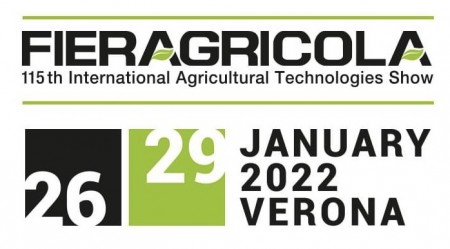Fieragricola puts the spotlight on the 2021-2027 Cap Reform, Lights and Shadows of the most important policy of the European Union for the agricultural world
12.07.2021
This morning’s webinar was organized in collaboration with the Food Trend Foundation
Verona, 30 June 2021. The newest policies including specific risk management resources, the possibility of leveraging biodiversity as an opportunity to promote Made in Italy agri-food, but also greater bureaucracy in the face of fewer financial resources available for farmers. As well as, the new constraints of social conditionality (the "third pillar" which introduces financing constraints for companies that do not respect labor rules), a crisis reserve to deal with any eventual "inconveniences" of a weather-climatic nature, production or market, and eco-schemes to require greater attention to the environment, moreover, an element on which agricultural businesses have shown increasing commitment to over the years.
The 2021-2027 Common Agricultural Policy reform, recently approved at the European Council of Agricultural Ministers after the agreement reached in the super trialogue between Parliament, Commission, and the EU Council, does not fully satisfy the agricultural world; as noted during the webinar organized this morning by Fieragricola - an international exhibition dedicated to agriculture, to be held at Veronafiere from 26 to 29 January 2022 - in collaboration with the Food Trend Foundation, which was attended by the Hon. Paolo De Castro, S&D Comagri coordinator at the European Parliament, Hon. Herbert Dorfmann, Comagri EPP coordinator at the European Parliament, Alessandro Apolito (Coldiretti Economic Area manager), Massimiliano Giansanti (president of Confagricoltura), Dino Scanavino (president of Cia-Agricoltori Italiani), Franco Verrascina (president of Copagri), Giorgio Mercuri (president of the Agri-food Cooperative Alliance). Speaking on the reform of the Common Agricultural Policy 2021-2027, which will be effective starting 1 January 2023 and which will be subject to a "mid-term review" in 2025, for the agricultural world there are perhaps more shadows than lights, but there is also the great - unprecedented - opportunity to develop a national strategic plan tailored to the needs of the territory and of Italian agricultural enterprises.
It is precisely a National Strategic Plan, which will have to be defined with the stakeholders and presented to the European Commission, that "we will have to work on, without forgetting that the negotiations overlapped with Covid, consequently lengthening times and that we continue to work in darkness for the long-term, ” said Alessandro Apolito, manager of the Economic Area of Coldiretti. For whom the CAP reform offers interesting insights with ‘the possibility of having risk management systems and protecting the agricultural worker’. Of course, we should not fall into the ideological traps that sometimes affect agriculture such as, ‘the demonization of animal husbandry, resulting in more indiscriminate attacks on any type of farming’. Under the microscope, in the future, “the measures contained in the Green Deal and in the Farm to Fork strategy, which without an assessment of their impact, risk having a negative effect,” concluded Apolito.
For the president of Confagricoltura, Massimiliano Giansanti, “the glass is half empty,” since it is a CAP reform, "based on bureaucracy, which does not seem to us to be a model of economic development with which to overcome the challenges of the future. Let's not forget that historically the Common Agricultural Policy was born in a phase of demographic development and with the aim of guaranteeing the right income to farmers and harmonizing the policies of the Member States. We expected a more ambitious and generous CAP for farmers, instead the resources are fewer and the reform itself has lost its economic soul and does not respond to the need to produce more food for a world that is still growing in population.”
The president of Cia-Agricoltori Italiani, Dino Scanavino, was also expecting a different CAP, pointing the finger at excessive bureaucracy. “We must face the challenge of competitiveness by focusing on production costs, favoring generational turnover in an effective manner, but also by supporting strategic production at the national level, without forgetting a comparison with the strategic plans of other nations such as France or Spain, so as not to be misaligned with respect to our competitors.” The efforts required to protect biodiversity, for Scanavino, “could be enhanced by Italy, the home of biodiversity with over 400 native vines.”
For Copagri's number one, Franco Verrascina, "the mission will now be to clearly choose the objectives to be included in the National Strategic Plan, valuing the role of farmers as custodians of the territory, clearly defining the role of the active farmer, and setting the ceiling for capping and planning support policies for young farmers.” The judgment towards the CAP 2021-2027, however, overall remains critical, because “farmers will have to respect greater commitments with fewer financial resources and more bureaucracy.” A knot, that of bureaucracy, moreover underlined by the Minister of Agricultural Policies Stefano Patuanelli upon the outcome of the agreement on the regulations of the CAP, in recent days.
On the third pillar, focused on social conditionality, “we are concerned about how it will be applied in other countries of the European Union, to avoid risks of competitiveness in disharmonious conditions. While the opportunity for production planning by the consortia representing Geographical Indications is a step forward that we appreciate,” said Giorgio Mercuri, president of the Agri-food Cooperative Alliance. Who reiterated the concerns expressed by a large part of the agricultural world, linked to an excess of bureaucracy and controls. At the political level, there was no lack of commitment in reaching the agreement on the part of the Italian MEPs: Paolo De Castro, S&D Comagri coordinator at the European Parliament, and Herbert Dorfmann, PPE Comagri coordinator.
“It will be a greener CAP that introduces environmental obligations,” explained the Hon. De Castro. We already see this with the eco-schemes, which incentivize farmers towards greener measures, which will be decided at the EU level and therefore without the risk of nationalization, although Member States have discretion within a framework defined by the EU.”
“It is a reform that 100% of farmers do not like, we are aware that obtaining the resources of the first pillar is more complicated than in the past. But it is a solution of compromises at the political level; however, we have a CAP that is more attentive to one of the great challenges today, which is climate change,” affirmed the Hon. Dorfmann. Who on this last aspect remarked, “the harmony of the European Parliament and Italian success, which asked that a 3% share of the funds dedicated to direct aid be reserved to strengthen the insurance system.”
-
 Press release
(PDF / 117,12 kB)
Press release
(PDF / 117,12 kB)
Contact
MŽ Consulting & Fairs
Poslovne storitve
Matjaž Žigon s.p.
Head Office:
Grčarevec 8
1370 Logatec
Slovenia
Tel.: +386 1 750 94 90
E-mail: info@mz-consulting.org
Turkey Office:
Fenerbahçe Mh. Dalyan Aralığı Sk.
Emek Apt. No:13 D:2 Kadıköy 34726
İstanbul Turkey
Tel.: +90 532 5214849
E-mail: hilal@mz-consulting.org
Fairs Activity Calendar
2024 Calendar
Expo Riva Schuh & Gardabags - Riva del Garda 13-16 January 2024
SIGEP - Rimini 20-24 January 2024
TISE - The International Surfaces Event Las Vegas 24-26 January 2024
FIERAGRICOLA - Verona 31 January-3 February 2024
Samuexpo - Pordenone 1-3 February 2024
Pescare Show - Vicenza 3-4 February 2024
Hospitality - Il Salone dell'Accoglienaza - Riva del Garda 5-8 February 2024
Aquafarm/Novel Farm - Pordenone 14-15 February 2024
ForumPiscine - Bologna 14-16 February 2024
OUTEX - Bologna 14-16 February 2024
MYPLANT & GARDEN - Milano 21-23 February 2024
CUCINARE - Pordenone 2-10 March 2024
Ortogiardino - Pordenone 2-10 March 2024
MYPLANT & GARDEN - Milano 21-23 February 2024
Progetto Fuoco - Verona 28 February-2 March 2024
Key Energy - Rimini 28 February-1 March 2024
Vinitaly - Verona 14-17 April 2024
Enolitech - Verona 14-17 April 2024
Sol & Agrifood - Verona 14-17 April 2024
Radioamatore Hi-Fi car - Pordenone 20 21 April 2024
Next Mobility Exhibition - Milano 8-10 May 2024
Transpotec - Milano 8-11 May 2024
Wine to Asia - Shenzhen 9-11 May 2024
Expo Riva Schuh & Gardabags - Riva del Garda 15-18 June 2024
Xylexpo - Milano 21-24 May 2024
RIMINIWELLNESS - Rimini 30 May-2 June 2024
Wine South America - Brasil 3-5 September 2024
MILANO Fashion&Jewels - Milano 14-17 September 2024
Marmomac - Verona 24-27 September 2024
SUN Beach&Outdoor Style - Rimini 9-11 October 2024
SIA Hospitality Design - Rimini 9-11 October 2024
FIERACAVALLI - Verona 7-10 November 2024
Ecomondo - Rimini 5-8 November 2024
IBE - Rimini 19-21 November 2024
2025 Calendar
MARCA - Bologna 15-16 January 2025
PTE - Milano 22-24 January 2025
Bit - Borsa Internazionale del Turismo - Milano 9-11 February 2025
SANA Food - Bologna 23-25 February 2025
Italia Legno Energia - Arezzo March 2025
Horeca Next - Pordenone 10-12 February 2025
SANA Beauty - Bologna 20-23 March 2025
ZOOMARK - Bologna 5-7 May 2025
AUTOPROMOTEC - Bologna 21-24 May 2025
IPACK-IMA - Milano 27-30 May 2025
Pharmintech - Milano 27-30 May 2025
RIVE - Pordenone 5-7 November 2025
HOST - Milano 17-21 October 2025
SICUREZZA - Milano 19-21 November 2025
MADE EXPO - Milano 19-22 November 2025
Global Elevator Exhibition - Milano 19-21 November 2025


